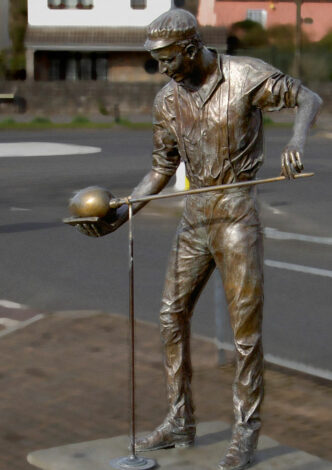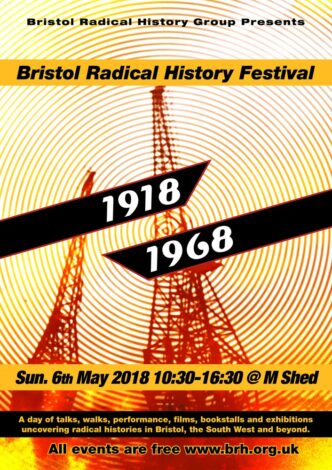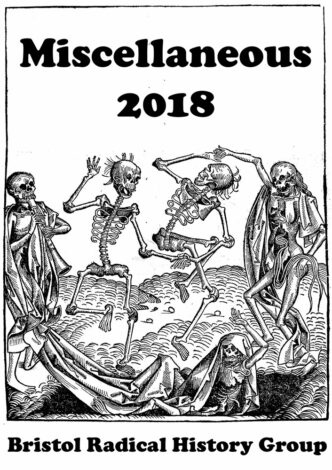There were a number of economic and political changes during the 16th and 17th centuries which prepared the ground for the establishment of the glass industry in Bristol. In 1522 the ‘Society of Merchant Venturers of the City of Bristol’ was incorporated. It grew in power and influence through the 17th century during which the Society revitalised and effectively reorganised itself to allow Bristol’s maritime merchants to take the fullest advantage of the Britain’s developing colonial […]
The events of 1968 are often represented by university occupations, protests against the war in Vietnam and the rise of the counter-culture. This however is a partial picture which excludes the aspirations of workers and their organisations in the period. Although action by Trade Unions was improving wages and conditions particularly in large industrial enterprises, the strength of these sections of the working class in Britain was being reflected in new, more radical demands. Equal pay and […]
 Not A BRHG Event
Not A BRHG Event
This talk given by Professor Lois Bibbings will consider conventional ideas about objectors alongside an exploration of who these men (and women) were, what they did and why, what happened to them and how they were viewed. A complex picture emerges which takes us a long way from stereotypical images of objectors as, for example, despised, rejected, unmanly, lacking courage and/or devotedly religious. This event is organised by the Bristol Skeptics Society and takes place at the Smoke and Mirrors […]
 Not A BRHG Event
Not A BRHG Event
Over 350 men from the Bristol area refused to fight in World War 1. They claimed the status of conscientious objector for moral, religious or political reasons. Some agreed to take non-military roles. Others spent much of the war in prison, often under harsh conditions. This illustrated talk presented by Professor Lois Bibbings tells the stories of these men and the people in the city who supported them. This event is part of a series of Lunchtime Lectures by Bristol Libraries. There is no need […]
Join collective bread, print & roses on a tour through Bristol’s radical past, present and future. Together we will bring to life the city’s dissenting history, its rich tradition of self-help and mutual aid, from the intellectual and political ferment of radical taverns, to pamphleteering, popular education collectives, the neo-liberal assault on education today and the radicalising impact of the UCU strike and ask what kind of education we need for all our futures.
St Pauls Carnival is held, usually on the first Saturday of July in Bristol. The celebration began life in 1968 as the St Pauls Festival, when the idea was "to create an event to help improve relationships between the European, African, Caribbean and Asian inhabitants of the area." Called the St Pauls Carnival since 1991, it is run by a non-profit organisation, St Pauls Afrikan Caribbean Carnival Limited. In 1968 the St Paul's Festival, had the aim of bringing together the European, […]
Poet and letterpress artist Dennis Gould began the early 1960s in Stafford Prison. Serving with the Royal Engineers during the 1950s, he later took up the cause of the Committee of 100, the direct-action wing of the anti-nuclear movement, carrying out acts of non-violent civil disobedience for which he was detained at her Majesty’s pleasure. In 1965 Dennis helped to organise an anarchist fringe festival of poetry at the Octagon in Bath. He continued to campaign and work with Peace News and then […]
On this history walk we will discover how Bristolians were fed during the early modern era (17th-19th Centuries). Hear how a rapidly expanding urban area, without the ability to feed itself, was kept supplied. How Bristol in turn helped supply the rural hinterland and its relationship with Wales and the wider world. How the market system worked, and how it was regulated, at times by the civic authorities, or by the “moral economy” and the crowd. What happened when the chain broke, and how did […]
Professor Bush offers a critical reassessment of the events of 1968 and their aftermath. He will look at May '68 in Paris in a broader context of global protest and changing narratives of political analysis and authentic action. He will give a brief account of his own experiences of the summer of 1968 at the Democratic Convention in Chicago, in the wake of the assassinations of Martin Luther King, Bobby Kennedy and Malcolm X. Thirdly, Professor Bush will examine a late echo of the sixties in the […]
Tony Benn was a great chronicler of his times and in this final chronicle of his life he reflects on the moments that defined his political and personal life experiences. This programme uses interviews recorded over time and an exclusive wide ranging final conversation in his later years together with unique, unseen family and personal film archive to chart the defining moments in his long political life. The programme is introduced by its producer, David Parker.



